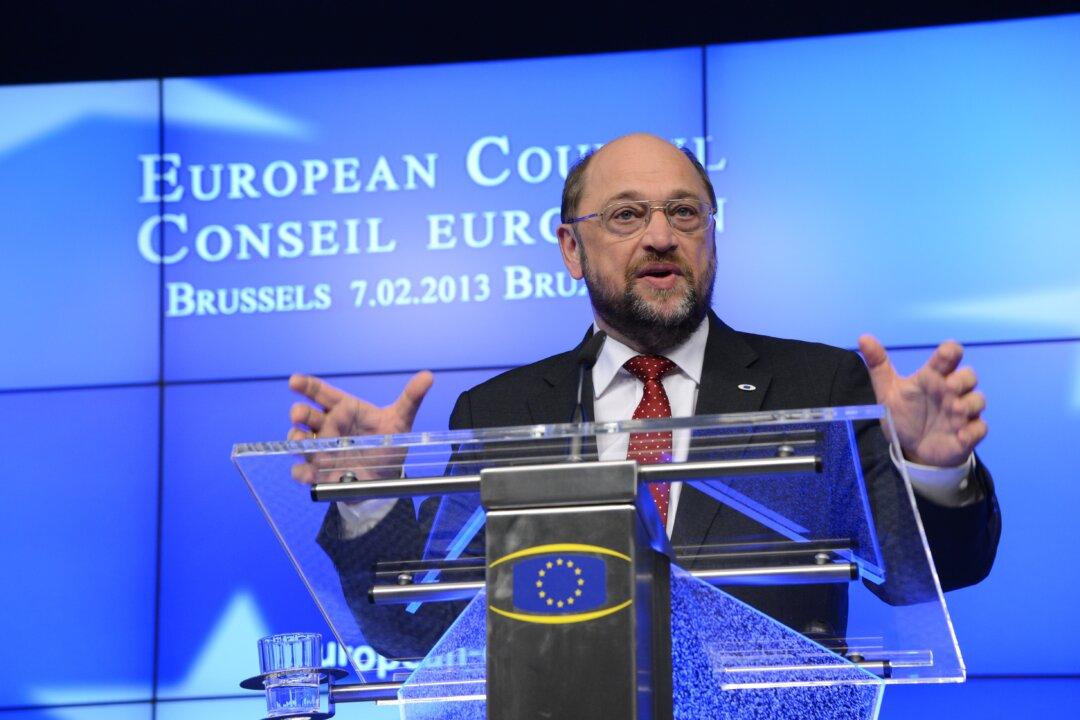In late March, Martin Schulz, president of the European Parliament, responded to a series of questions from The Epoch Times about current affairs in China, sharing his thoughts on topics ranging from the new leadership to the persecution of dissident Hu Jia.
Schulz has been the President of the European Parliament (EP), which is the legislature of the European Union, since the beginning of 2012.
He has been following the reshuffling in the Chinese Communist Party with great interest, particularly new leader Xi Jinping’s inaugural speech, with its rhetoric about intra-Party democracy and the crackdown on corruption in officialdom.
“Reforms, such as strengthening the rule of law, are never easy, and entrenched interests are a powerful force against change,” Schulz said in the written interview. “But reforms pave the way for greater prosperity and societal harmony. Stagnation ultimately leads to disruption.”
Also on the discussion table was the re-education through labor or “laogai” system, after new premier Li Keqiang announced last month a plan that is being prepared to reform the highly controversial network of work camps.
Schulz hopes to see some “tangible progress” here. He said that the European Parliament has condemned the labor camp system, which is a regular human rights topic during dialogue with the People’s Republic of China.
“The Laogai system violates several articles of the International Covenant on Civil and Political Rights, and in particular those articles which prohibit forced or compulsory labor, and those which state that no one should be imprisoned without a proper trial.”
In 2008, the European Parliament awarded the Sakharov Prize for Freedom of Thought to Hu Jia, who was in jail at the time, serving a 3.5-year sentence for penning essays and engaging in activism that the Communist Party objected to. Schulz described Hu’s activism on environmental issues and raising awareness about HIV/AIDS and human rights in general as “exemplary.”
During the meetings of the National People’s Congress and the Chinese People’s Political Consultative Congress, bodies which support Party rule, in Beijing last month, Hu was taken away by police and beaten for “provoking quarrels and making trouble.” The vague charge probably referred to an opinion piece Hu posted online about the new Party leadership.
Schulz was concerned to learn about this “arbitrary detention,” noting that the EP has repeatedly expressed its disapproval of Hu’s house detention and inadequate access to healthcare, because Hu has liver cirrhosis from previous abuses suffered in detention. “This episode unfortunately adds up to an already depressing tally of mistreatment and intimidation towards him,” Schulz added.
On the issue of cybersecurity and a recent spate of attacks on civilian and government sites in the United States traced to a unit of the People’s Liberation Army, Schulz said the European Commission is developing a new strategy to deal with this problem, which is “a global concern” that the EU takes “extremely seriously.”
“The EU aims to engage with international partners and organizations, as well as the private sector and civil society to foster international cooperation in cyberspace issues. Our goal is to strike the right balance between freedom and openness on one side and protection from cyber threats on the other.”
Schulz is hopeful that the regime’s new leadership will put the Chinese people first, and make real changes, rather than just talking about them.
“I believe the Communist Party of China has a choice here,” he wrote. “Either be in the driving seat of political change or be faced with an increasingly pressing demand to reconcile the differing needs and demands of the Chinese people.”
He also wrote: “We in Europe would like democracy in China to expand not just within, but also beyond the Party.”
Written in English by Cassie Ryan.
Read the original Chinese article.

